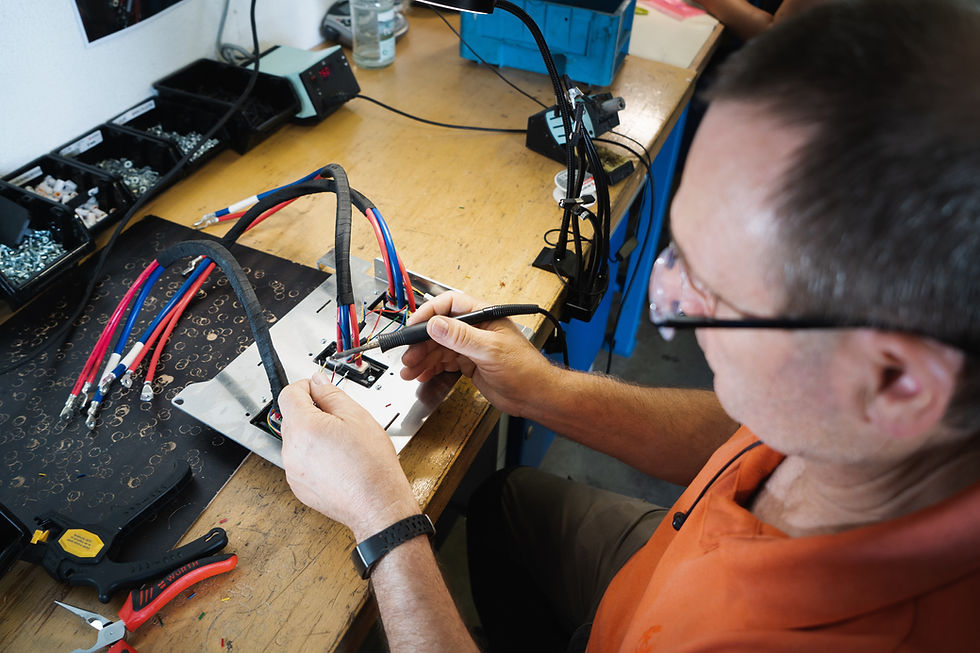Swapping Stories: Safety and the Power of Memory
- Steve Oliver

- Sep 22, 2025
- 4 min read
Before I ever understood electricity, I understood fear and loss.
When I was a young boy in Maine, my dad was helping my grandfather put up a CB
antenna in the yard. It was a hot day. I remember the smell of grass. The tall pole. The feeling of summer.

Then everything changed.
The antenna made contact with a power line. There was a sharp crack – fast and violent, and just like that, he was gone.
My dad didn’t survive.
That was a long time ago. But that moment split my life into before and after. I didn’t know it then, but it left a mark that shaped my entire career.
Sharing Memory
I’ve done a lot in my life… I was a soldier, sailor, cab driver, oil field worker, real estate agent… and finally, a thermographer. But that summer day stayed with me.
For most of my life, I didn’t talk about the accident. I still don’t, really. It was just a terrible thing that happened, and something that I carried quietly.
I’ve always been nervous around electricity. I hesitate before plugging things in. I can’t
open panels. Not “I don’t want to”; I can’t. My body just shuts down. Strangely, my life now revolves around electrical safety.
My story may be unique, but having a story isn’t. Those are what make us who we are. Narratives frame our life, allow us to make sense of our world.
Keeping us safe is one of the most basic functions of memory. Over time, we develop a sort of heatmap of what’s safe and what’s not. What feels good and what scares us — hiding in the back of our minds.
Memory is unique to each person. We all have different datasets inside our heads that have taught us how to survive this world. But we can only know what we know… until someone shares with us.
And that’s how I teach others about safety. We share stories and learn.
Memory, Trust, and Safety
When I’m on a worksite talking safety with a team, people aren’t always exactly enthusiastic to talk about precautions, PPE, and emergency protocols. This is just their everyday routine.
But when someone shares an anecdote from their life, what’s the natural response? You want to share a similar story. They open up, you open up. That’s trust and community being built in real time.
So, I tell stories. Whether it’s from my army days or from the oil fields, I tell a story or two. Suddenly, we’re swapping stories left and right. We’re getting to know one another, learning to respect each other… and learning from each other’s experiences.
I ask teams to talk about the worst accidents that they’ve seen. People love to tell those stories… like that car wreck when you can’t look away. But it’s more than that. It reminds them, and it teaches everyone around them.
If you hear a buddy tell a story about an arc flash caused by corrosion in a motor control center, you’re going to think about that the next time you’re doing work in the control room. Stories shape our understanding, even if they aren’t our stories.
It’s more than just spreading knowledge. A person may have buried a memory deep, but telling it brings it back to the forefront for them too. They’re thinking about what it taught them, what could’ve gone worse, what they’d do differently now.
That’s not just memory. That’s wisdom.
Wisdom is Personal
I didn’t set out to face my fear or make peace with the accident that took my dad from me. I just kept following the thread: asking questions, wanting to understand the thing that changed my family forever.
And somewhere along the way, I found meaning.
Not as someone who’s fearless, but as someone who remembers. Someone who knows what it's like to lose the person that you love. I still can’t open a panel. But I can tell the truth.
I can speak up when something doesn’t look right. I can share my experiences so that others don’t have to share the tragedy. Because if sharing this story keeps one person from living through the same, that’s enough.
The daily risk assessment is just a row of checkboxes. Safety protocols are just a list of rules to follow. Those things become routine. But stories have power.
So here’s all I ask:
Before we walk onto your job site...
Before you sign off on another checklist...
Before you say, “We’ve done this a hundred times.”
Stop. And ask yourself one thing: “Would I bet my family on this being safe?”
Because someone is making that bet. Behind every outlet, every panel, every routine job, there’s a human life at the end of that current. A dad. A daughter. Someone’s whole world.
Safety is personal. Make it matter before it hurts. That’s the challenge… not just to follow the rules, but to lead with them.
What we do isn’t just about power. It’s about protecting the lives that power connects.
Steve
Steve Oliver is a seasoned Business Development Specialist and Level 2 Thermographer, a nationally recognized speaker and educator on industrial safety.



